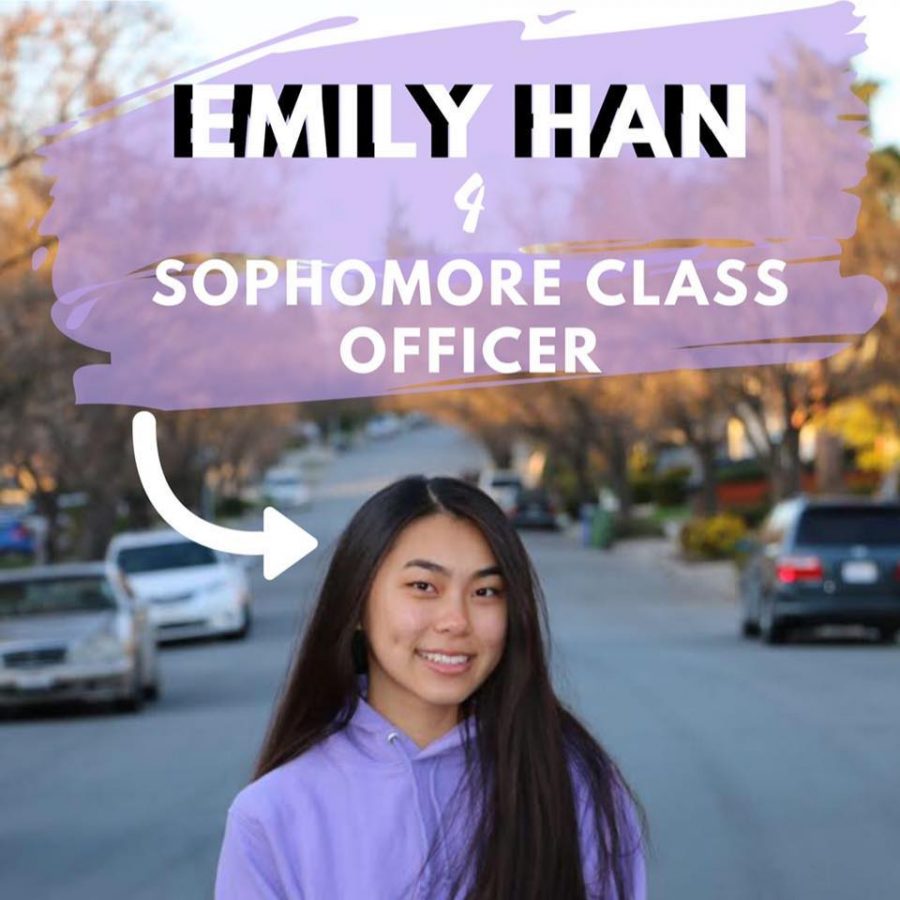Candidate Emily Han
“When an activity is fun, more people want to do it.”
Geetika: If you could summarize your campaign in one word, how would you describe it? Why?
Emily: Communication. I think communication because it’s such an important key factor for everything, to make sure that people come to events or even like help out. Especially at bench buildings, to let people know that there’s a bench building this week, so make sure to come. To gather everyone. I think that it’s a little too general right now. If people were to just post it on their Instagram stories, it’s like, oh it gets out to the general public. But people often just tap through. I think it’s important that you can go through your individual contact list and make sure to send a personalized invitation. The person that’s receiving it will feel like it’s an invitation.
G: Why are you the best candidate for class officer?
E: I think I’m a good candidate because I have previous experience. I was the secretary at Weibel in sixth grade and the secretary at Horner in eighth grade. I think that having this position has really helped me learn that, gain experience. And it just helped me see what people respond to the best. And I saw that people respond really well to positive encouragement. And I like to think that I’m a positive person, so, you know, just encouraging people and letting them know that their good motivates them.
G: What is one way you would gain input from your class?
E: I talked about how I pick up on things quickly in my speech today, and I like to communicate with others. I think that one unutilized method of doing this would just be like an Instagram poll, you could ask everyone about.
G: What do you want to get done as class officer?
E: I want class council to be more engaged. I think that class council members do a lot of their activities during summer so it’s mainly focused on bench buildings. Which is totally fine, but I also want class council to be able to do activities like that during the school year. So whether it could be holding a fundraiser or having our own fundraiser, it could be really helpful.
G: What would you do differently than what is being done this year?
I would try to make benchbuildings more fun. Honestly, I think that it’s a really huge factor because when an activity is fun, more people want to do it. Having a lot of people there is not only for spirit, but efficient to get things done. Instead of generally saying, say, “our topic is this, and we have to build this,” I would have individual roles for people who want to work on this section. I would make it more organized and make sure that everyone should have a specific role, and then they could also be held responsible.
G: What ideas do you have for homecoming?
E: I think that Homecoming is such a fun spirit week. It’s a really good way to bring up spirit. Some ideas I had that I had were like, interactive spirit days and flexes where we could all enjoy and have fun and build up the spirit. We should have an activity during flex where people sign up. And we all write the names of who should be the next HOCO king and queen or even like prom, I think it would be really great to have fun superlatives like that.
G: How will you organize class dances? How will you get the class to participate in them?
E: There should be people set in that group. For example, people who like to dance could volunteer and say oh yeah, I would like to choreograph, and that’s what we did in freshman year. And I think it worked out pretty well, a lot of people came to the dance practice. The choreographers made it fun, and making fun is important because more people will want to participate.
G: How will you encourage school spirit in your class?
E: I think a really big reason why people don’t participate is because our spirit days aren’t accessible- for example, [in] the multicultural week, a spirit day was to dress up in cultural clothes. The problem with that was that many of my friends didn’t have clothes like that, or what they had was difficult to wear or uncomfortable. We could have passed out little flag pins or something simple and easy like that to give people a simpler way to participate.
G: How will you recruit students for class council?
E: I know last year there was not enough time to do interviews and ensure that people were committed. I think that interviews, and meeting someone face to face and letting them know that this is something that you have to be committed to and that it’s a really important job, and so if they’re willing to commit.
G: How are you going to organize and manage this large group of students in your class council?
E: Obviously, making group chats and stuff is really important. And sending information out personally. And also, having a rewards system is really important. Because having a positive encouragement system is really important. And even if it’s something simple like, you can get a certificate, people will be motivated more.
G: Looking back, what do you feel is the main difference between ASB and ASG, now that you have been able to experience both?
E: I think that ASB in Horner was not as independent as ASG now, because I think that in ASB it was super advisor-dependant. Mr. Schaffer would look through everything to make sure that it was okay, but ASG is really a self-run govt.
G: Thanks for your time!

